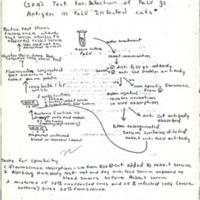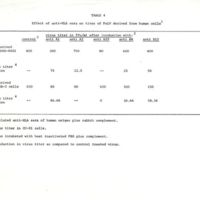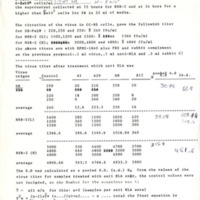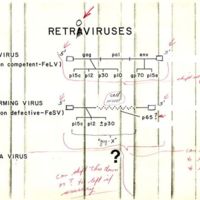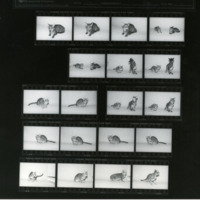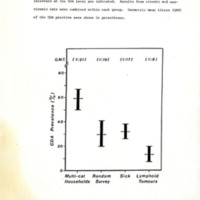Myron "Max" Essex
Myron Essex, (born 1939) Coventry, Rhode Island, is the Mary Woodard Lasker Professor of Health Sciences, Harvard T.H. Chan School of Public Health, Boston, Massachusetts, and the Chair, Botswana-Harvard AIDS Institute in Gaborone, Botswana. Essex’s research has focused on the link between retroviruses and immunosuppressive disease in animals and human beings, including HIV-AIDS; he is responsible for the discovery of gp120, the virus surface protein used for blood screening and HIV detection, and the identification of the simian T cell leukemia virus (STLV) and the simian immunodeficiency virus (SIV) in monkeys, and the HIV-2 virus in people in West Africa.
Myron “Max” Essex completed his Doctorate of Veterinary Medicine at Michigan State University, East Lansing, Michigan, in 1967, and then received his Ph.D. from the University of California, Davis, in 1970. He began his career conducting laboratory research relating to feline leukemia and in 1971 was a postdoctoral fellow at the Karolinska Institute, Stockholm, Sweden. Over time, his research transitioned from the study of retroviruses in animals to human beings, which led to his focus on HIV/AIDS. Essex served as an Assistant and Associate Professor at the Harvard T.H. Chan School of Public Health (1972-1978) and was a lecturer, Department of Pathology at Harvard Medical School (1976-1992). In 1979, he became a Professor of Virology, Harvard School of Public Health. Essex acted as the Chairman, Department of Microbiology, Harvard School of Public Health (1978-1982), and continued to act as the Chairman of the renamed and restructured Department of Cancer Biology (1982-1997). He then became Chair of the Department of Immunology and Infectious Diseases, a role he held until 2006. He has acted as the Chair of the Harvard AIDS Institute, now known as the Harvard AIDS Initiative, since 1988, and was involved with the development of its educational programs. Essex was offered the position of the Mary Woodard Lasker Professor of Health Sciences at Harvard University in 1989, and has held this position ever since. He was also the John LaPorte Given Professor of Infectious Diseases (1998-2006).
Since 1986, Essex has developed programs for AIDS collaboration across the world. In 1996, Essex helped to organize the Botswana-Harvard Partnership for HIV Research and Education, a cooperative effort between the Ministry of Health in Botswana and the Harvard AIDS Initiative. He is currently the Chair of the Botswana-Harvard AIDS Institute in Gaborone, Botswana, and has been the Chair of the Harvard T.H. Chan School of Public Health AIDS Initiative, Boston, Massachusetts since 1988. Essex has been a member and served on the board of numerous professional organizations, as well.
Much of Essex’s scientific research relates to the transmission of retroviruses and their link to immunosuppressive diseases in both animals and human beings. Working with William A. Haseltine (born 1944) he was among the first to link human and animal retroviruses to immunosuppressive diseases, and, with Robert Gallo (born 1937) and Luc Montagnier (born 1932), to theorize that AIDS was caused by a retrovirus. Alongside fellow scientists, Essex provided the first evidence that HIV could be transmitted through blood transfusions and sexual intercourse. In 1984, with colleagues, Essex identified gp120, the virus surface protein that is used for blood screening, HIV detection, and epidemiological monitoring. He was part of the group that discovered the first simian immunodeficiency virus, as well as HIV-2 in human beings.
Currently, he conducts research related to the virology, immunobiology, and molecular epidemiology of HIV-1 viruses, especially the HIV-1C of southern Africa. Essex has laboratories at both the Harvard T.H. Chan School of Public Health, where research focuses on the evolution of new HIV viruses; and the Botswana-Harvard AIDS Institute, where his research focuses prevention of new HIV infections through the Botswana Combination Prevention Project, as well as drug development to decrease mother to infant transmissions, drug resistance, and the possible transmission of drug resistant HIV variants. Essex has been involved with education about the HIV viruses through the Harvard T.H. Chan School of Public Health as well as professional conferences on the topic.
For his work, he has been awarded nine honorary doctorates and numerous awards, including the Lasker Award in 1986, along with Robert Gallo and Luc Montagnier, and the HIV Lifetime Achievement Award for Scientific Contributions in 2011. Throughout his career, Essex has published more than 600 scientific research papers and twelve books.
The below records display Essex's early research into the structure, spread, and treatment of animal retroviruses, especially FeLV (feline leukemia virus).



